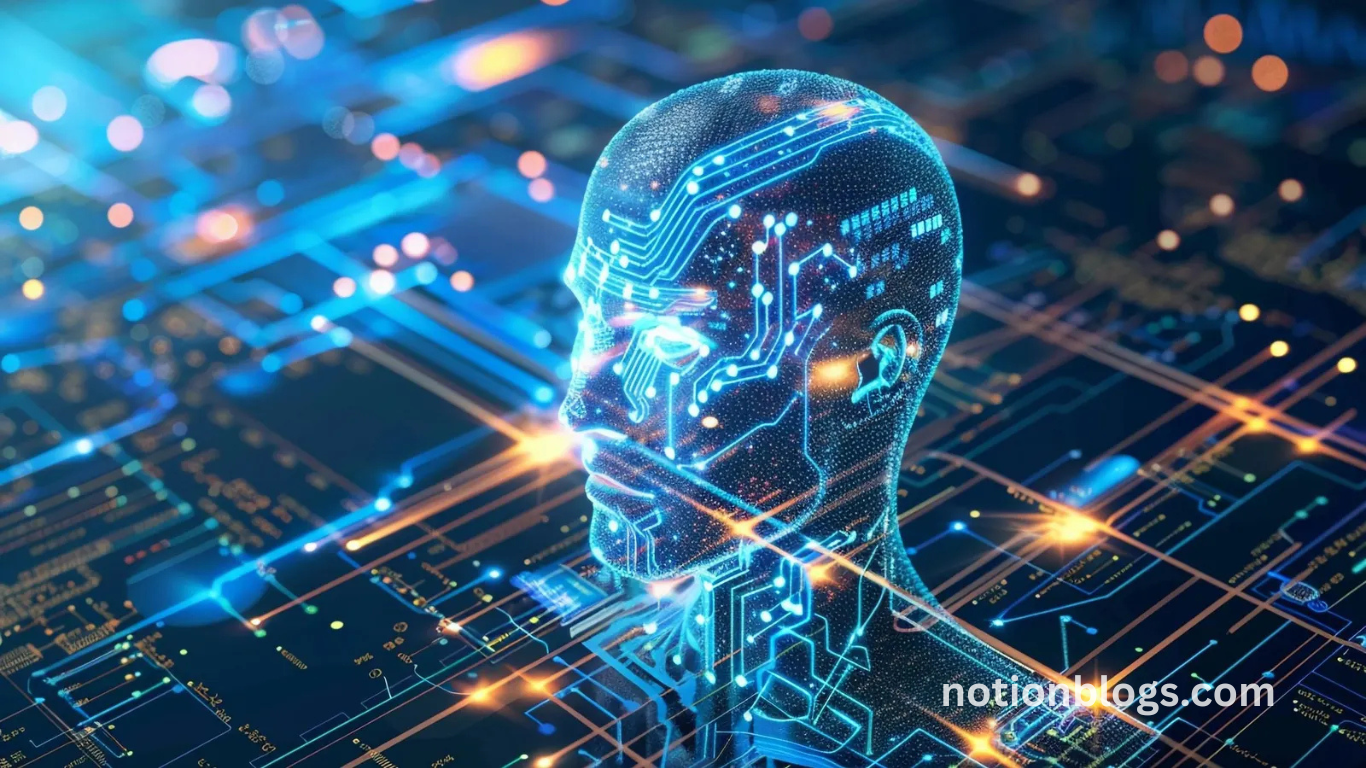Artificial Intelligence (AI) is no longer a futuristic concept confined to sci-fi novels or tech conferences. It is now deeply embedded in our daily lives, powering everything from personalized recommendations on streaming platforms to the way businesses operate, create, and innovate. The integration of AI into various sectors marks a monumental shift in how society functions, changing the very fabric of human interaction, creativity, and productivity.
This transformation is not just technical but also cultural. As AI becomes more advanced and accessible, it’s opening new doors in healthcare, finance, art, education, and beyond. These developments raise compelling questions: How will our future look with AI as a central force? What are the opportunities and challenges that lie ahead? This article explores how AI is reshaping our world and what it means for the future of human life and creative expression.
AI in Daily Life Enhancing Efficiency and Personalization
Artificial Intelligence has rapidly become integral to our everyday activities. From voice assistants like Alexa and Siri to smart home systems that adjust lighting and temperature, AI makes life more convenient and efficient. Personalized shopping recommendations, predictive text, and facial recognition are just a few examples of how AI is enhancing user experiences and saving time.
In transportation, AI powers ride-hailing services, traffic navigation, and even autonomous vehicles. It’s also behind spam filters in email, fraud detection in banking, and algorithms that recommend movies or music based on individual preferences. These systems learn from user behavior, improving their services over time. By analyzing massive datasets, AI delivers tailored solutions, transforming our habits, consumption, and interactions seamlessly and intelligently.
AI Transforming Healthcare with Faster Diagnoses and Predictive Insights
In the healthcare sector, AI is making life-saving advances by helping doctors detect diseases faster and more accurately. Machine learning models are now used to interpret medical imaging, spot tumors, and predict health risks with remarkable precision. These technologies assist in early diagnosis of conditions like cancer, diabetes, and cardiovascular disease, where timing is critical.
AI-powered chatbots and virtual health assistants provide patients with real-time advice, reducing the burden on medical professionals. Predictive analytics also enable hospitals to anticipate patient admissions and optimize resource allocation. AI in drug discovery accelerates the development of new treatments by simulating outcomes before clinical trials. These innovations make healthcare more proactive, affordable, and accessible, ultimately improving patient outcomes across the globe.
AI in Creative Industries Enabling New Forms of Art and Content Creation
AI is not just changing how we work—it’s revolutionizing how we create. From digital art to music composition, AI tools like DALL·E and ChatGPT are enabling artists, writers, and creators to push boundaries. These tools can generate artwork, suggest plotlines, or even compose symphonies, offering fresh inspiration and streamlining creative workflows.
Read More : The Best Movies You’ve Never Seen – The Rock
Filmmakers use AI to generate realistic visual effects, while musicians collaborate with AI to develop unique soundscapes. In writing, content generators assist in drafting articles, blogs, and scripts. These technologies democratize creativity, allowing individuals without traditional training to participate in artistic expression. However, they also raise questions about authorship, originality, and ethical use, prompting ongoing debate within the creative community.
AI in Business Driving Smarter Decisions and Operational Efficiency
AI is fundamentally reshaping business strategies and operations. From automating customer service through chatbots to optimizing supply chains with predictive analytics, companies across industries are using AI to increase efficiency and drive innovation. AI helps identify market trends, customer behavior patterns, and operational inefficiencies, enabling data-driven decisions.
In finance, AI detects fraud, recommends investments, and facilitates algorithmic trading. Retailers use it for demand forecasting and inventory management. Marketing departments leverage AI to personalize campaigns and maximize ROI. These applications reduce costs, enhance customer satisfaction, and provide a competitive edge. As AI tools become more sophisticated, businesses of all sizes will increasingly rely on them to stay relevant and profitable.
AI and Education Personalizing Learning and Improving Outcomes
In education, AI is transforming both teaching and learning experiences. Intelligent tutoring systems analyze student performance and provide customized lessons tailored to individual needs. These systems adapt in real-time, helping students learn at their own pace and providing additional support where needed.
Teachers benefit from AI by automating administrative tasks like grading and attendance tracking. AI also offers valuable insights into student engagement and learning gaps. Virtual reality and AI-powered simulations make learning more immersive and interactive. As education becomes more digitized, AI ensures inclusivity and accessibility, especially for students with disabilities or language barriers, helping bridge the educational divide.
AI and Ethics Addressing Bias, Privacy, and Responsibility
As AI becomes more embedded in our lives, ethical concerns have come to the forefront. Algorithms can unintentionally reflect or amplify biases present in the data they are trained on, leading to unfair outcomes in areas like hiring, policing, or lending. Addressing this requires transparency in how AI systems are designed and deployed.
Privacy is another critical issue. AI systems often rely on vast amounts of personal data, raising concerns about surveillance and consent. Governments and tech companies must enforce data protection policies and ethical standards. There’s also the challenge of accountability—when AI makes a mistake, who is responsible? These issues demand collaborative efforts among developers, regulators, and users to ensure that AI is used fairly and responsibly.
The Future Workforce Adapting to AI-Driven Job Transformation
AI is reshaping the job market, automating routine tasks while creating demand for new roles. Jobs in data analysis, AI training, cybersecurity, and human-AI collaboration are on the rise. Workers now need to adapt by developing digital skills, critical thinking, and emotional intelligence—areas where humans still outperform machines.
Rather than replacing humans entirely, AI is augmenting their abilities. For example, doctors use AI for diagnostics, but human judgment remains essential. In factories, robots handle repetitive tasks, while humans manage oversight and innovation. The future workforce will thrive not by competing with AI but by working alongside it. Lifelong learning and upskilling will be crucial to navigating this evolving landscape.
AI in Smart Cities Enhancing Urban Living and Sustainability
Smart cities are emerging as AI integrates into urban planning, transportation, and infrastructure. AI-powered traffic systems reduce congestion and emissions, while predictive maintenance helps manage utilities and public services more efficiently. These technologies contribute to safer, greener, and more livable cities.
Public safety also benefits from AI with surveillance systems that detect anomalies and emergency prediction tools. Waste management becomes smarter with sensor-equipped bins and optimized collection routes. In energy, AI enables dynamic grid management, promoting renewable energy integration. Smart cities exemplify how AI can tackle global challenges like climate change, resource scarcity, and urbanization through data-driven solutions.
Frequently Asked Questions
What is AI, and how does it work?
AI, or artificial intelligence, refers to computer systems that mimic human intelligence. It works by processing large amounts of data, learning patterns, and making decisions or predictions based on that data.
How is AI affecting the job market?
AI is automating repetitive tasks and creating new jobs in tech, analysis, and creative fields. To stay competitive, workers must adapt by acquiring digital and soft skills.
Is AI safe to use in healthcare?
Yes, when used properly, AI improves diagnostic accuracy, patient monitoring, and treatment planning. However, ethical use and regulatory oversight are essential.
Can AI be creative like a human?
AI can generate music, art, and writing based on data, but it lacks human intuition and emotional depth. It’s best used as a tool to enhance human creativity.
What are the ethical issues with AI?
Key issues include data privacy, algorithmic bias, job displacement, and accountability for AI decisions. Transparency and regulations are crucial to address them.
How does AI improve education?
AI personalizes learning, tracks progress, and automates grading. It makes education more adaptive, inclusive, and accessible, especially in remote or under-resourced areas.
Are smart homes and smart cities really powered by AI?
Yes, AI powers systems that control lighting, energy, traffic, waste management, and public safety, making environments more efficient and responsive.
What skills will be necessary in an AI-driven future?
Digital literacy, problem-solving, creativity, emotional intelligence, and adaptability will be vital. Continuous learning is key to thriving alongside AI.
Conclusion
AI is redefining the way we live, work, and create, offering both opportunities and challenges. As technology advances, embracing ethical practices and continuous learning will be vital for a future where humans and machines thrive together. Let’s shape that future with curiosity, innovation, and responsibility.



